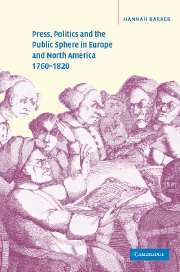Book contents
- Frontmatter
- Contents
- Notes on contributors
- Acknowledgements
- Introduction
- 1 The cosmopolitan press, 1760–1815
- 2 The Netherlands, 1750–1813
- 3 Germany, 1760–1815
- 4 England, 1760–1815
- 5 Ireland, 1760–1820
- 6 America, 1750–1820
- 7 France, 1750–89
- 8 The French revolutionary press
- 9 Italy, 1760–1815
- 10 Russia, 1790–1830
- Index
1 - The cosmopolitan press, 1760–1815
Published online by Cambridge University Press: 05 July 2009
- Frontmatter
- Contents
- Notes on contributors
- Acknowledgements
- Introduction
- 1 The cosmopolitan press, 1760–1815
- 2 The Netherlands, 1750–1813
- 3 Germany, 1760–1815
- 4 England, 1760–1815
- 5 Ireland, 1760–1820
- 6 America, 1750–1820
- 7 France, 1750–89
- 8 The French revolutionary press
- 9 Italy, 1760–1815
- 10 Russia, 1790–1830
- Index
Summary
The celebrated cosmopolitanism of Enlightenment Europe was bound together by a common elite culture, a common elite language (French) and a common news media. In consequence, it is surely not unreasonable to envisage a European public, and even a pan-European public sphere, albeit a narrow and largely aristocratic one, which transcended national publics. For from the Huguenot diaspora to the Napoleonic period, there existed beyond French borders a French-language press that aimed to provide a steady flow of news information and, increasingly, opinion, to an international elite. This press – comprising political newspapers produced beyond France's direct sphere of influence for a European audience – is the subject of this chapter. Although these papers were written in French, and at times circulated widely inside France, the chapter's focus will be on Europe generally, both because the role of international papers inside ancien regime France is discussed below in Jack Censer's chapter, and because they had difficulty circulating there after 1792. Journals aimed primarily at local francophones in Belgium, Switzerland, Germany, Poland and other countries are not considered here, nor are the specialised journals that proliferated in eighteenth-century Europe. While most international papers were what Jerzy Lojek has termed ‘international gazettes’, a few periodicals – such as the Journal encyclopédique or Jean-Gabriel Peltier's émigré publications – which contained substantial news sections are also worthy of mention. However, they could not compete with the gazettes for freshness, and risked accusations of providing ‘news which is not news’.
- Type
- Chapter
- Information
- Publisher: Cambridge University PressPrint publication year: 2002
- 6
- Cited by



